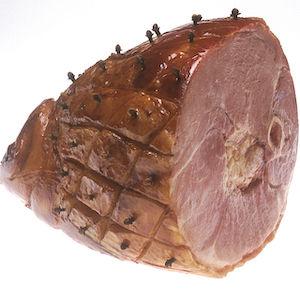Routine doctor's appointments usually end the same way. The doctor encourages you to exercise, stress less, and eat healthy, usually mentioning something about vegetables and fiber. It's all good advice that we endorse, but just for once, it would be nice if the doctor told us to eat more ham.
More than just providing basic nutrition, many foods contain "bioactive peptides," short protein fragments that can influence our health. For instance, bioactive peptides that are antimicrobial, anti-inflammatory, or act as antioxidants have been identified. Likewise, other bioactive peptides are anti-hypertensive; i.e., they help fight high blood pressure.
A team of mostly Spanish researchers decided to examine the potential health benefits of a very popular dish in that country: dry-cured ham. The researchers took dry-cured ham bones, which are often used to make stews and broths, and processed them in a way that was similar to what might occur in a kitchen from the average Mediterranean home. Next, they extracted proteins and subjected them to a simulated digestion.
(All of this was necessary because any bioactive peptides in the ham would need to survive the harsh conditions of cooking and digestion to have any potential biological effects on the human body.)
Finally, the team was ready to determine if their bone brew was able to do anything physiologically useful. They were primarily interested in cardiovascular health, so they assayed for the presence of "heart healthy" bioactive peptides. Indeed, they found peptides that could possibly reduce blood pressure and alleviate type 2 diabetes, obesity, atherosclerosis, and other inflammatory diseases.
Dry-Cured Ham Contained ACE Inhibitors
People who have high blood pressure are often put on a drug called an ACE inhibitor. These drugs work by blocking an enzyme called angiotensin converting enzyme (ACE), which is involved in raising our blood pressure via a complex pathway known as the renin-angiotensin-aldosterone system.
ACE inhibitors made by the pharmaceutical industry often end in the suffix "-pril" (e.g., benazepril). But apparently, they can also be found in the bones of dry-cured hams, raising the possibility that people who regularly consume these foods are giving themselves a nice little dose of naturally occurring blood pressure-lowering drugs.
This isn't so far-fetched. The pseudonymous blogger "Skeptical Cardiologist" writes: "Despite eating lots of Jamon [dry-cured ham], however, the Spanish and Basque do very well in terms of longevity and rates of heart disease."
Of course, ham may not be the only explanation for his observation. The Mediterranean diet differs in several ways from the typical American diet. Maybe it's all the fish, olive oil, and wine they consume. But it's a happy day to learn that ham could also be a health food.
Source: Marta Gallego, Leticia Mora, Maria Hayes, Milagro Reig, and Fidel Toldrá. "Peptides with Potential Cardioprotective Effects Derived from DryCured Ham Byproducts." J. Agric. Food Chem. 67 (4): 1115-1126. DOI: 10.1021/acs.jafc.8b05888




